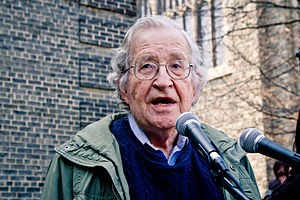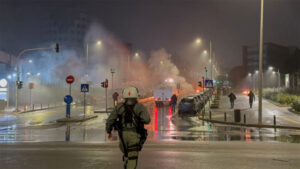Noam Chomsky has criticised the anti-fascist movement and argues its tactics are a gift to the far right and US state repression.
The renowned academic, widely considered the founder of modern linguistics, says anti-fascists have instigated the use of violence in wholly reprehensible ways.
Antifa, shorthand for the anti-fascist movement, refers to a loose decentralized coalition of groups which oppose the far right via grassroots action rather than depending on the police or the state. While the movement dates back to the rise of fascism in Europe in the 1920s, it has gained increasing attention since anti-fascist activists clashed with neo-Nazis, Ku Klux Klan members and alt-right supporters at a white supremacist rally in Charlottesville over the summer.
Tensions between fascists and counter-protesters made headlines across the world after a 20-year-old man, who officials say had Nazi sympathies, mowed his car into the crowd of peaceful anti-fascist demonstrators and killed a female civil rights activist.
The spotlight on the movement intensified again in September after confidential documents obtained by Politico revealed federal authorities had been warning state and local officials since early 2016 that Antifa had become increasingly confrontational and dangerous, and the Department of Homeland Security formally classified their activities as “domestic terrorist violence”. President Donald Trump subsequently berated Antifa as “bad dudes”.
Chomsky, a prominent voice on the left, has now voiced his frustrations with Antifa, telling The Independent that physically preventing members of far-right groups from expressing their views is counter-productive.
“Antifa is very far from a structured organization. It is largely a collection of people disturbed about the ugly and ominous forces that have broken into the public arena with particular venom since Trump removed the cork from the bottle,” the 89-year-old says.
“Associated with the loose Antifa array are fringe groups that have initiated the use of force in ways that are completely unacceptable and are a welcome gift to the far right and the repressive forces of the state, while also providing some justification for the absurd claim that Antifa is comparable to the far-right forces.”
Chomsky argues that violence paves the way for state actions reminiscent of Cointelpro (acronym for Counter Intelligence Programme), which he describes as “the most extreme domestic state-terrorist programme in US history”.
This is a reference to a series of covert and often illegal projects carried out by the FBI aimed at scrutinizing, infiltrating and disrupting political organizations. The anti-Vietnam war movement, which Chomsky played a key role in, and the Civil Rights movement were subject to such measures.
Chomsky, who recently left his post as Institute Professor Emeritus at the Massachusetts Institute of Technology to become a laureate professor at the University of Arizona, believes such events should be allowed to go ahead but be challenged with non-violent confrontation and educational methods of resistance.
“Unlike repression of the left, typically tolerated (even approved), repression of the right elicits great concern and sometimes support for the targets as they claim the high moral ground of ‘defending basic civil rights’,” he says. “That’s quite apart from the opportunity cost, the failure to use the opportunity to expose their doctrines and actions, and the threat they pose to civilized existence.”
Although the media and many Americans only associate the anti-fascist movement with militant direct action, it is worth remembering activists adopt a plethora of tactics. Urging venues to cancel far-right events or shutting down such events through direct action is just one strategy among many others which include union organization, migrant solidarity, public education programmes and outing neo-Nazis to their neighbours and employers.
Chomsky also argues the current manifestation of the anti-fascist movement should not be compared with earlier historical configurations, warning against conflating the current state of the far right in the US with the growth of fascism in Europe in the early twentieth century.
The anti-fascist movement has a long history, which dates back to fighting Benito Mussolini’s Blackshirts in the 1920s and then Adolf Hitler’s Brownshirts in the taverns of Munich. In Britain, activists mobilized against Blackshirts led by Oswald Mosley, the leader of the British Union of Fascists, in Cable Street, east London, in the 1930s.
“The differences are radical,” Chomsky says. In the 1930s, the Nazis ruled Germany, fascism had been established for years in Italy, and there were powerful fascist movements elsewhere.
“There was a literal death struggle between fascism and labour (and of course much beyond). There are many ominous developments today but nothing remotely like that. In particular, in the US it’s hardly the case that the working class is confronting the far right.”
Dr Mark Bray, a leading scholar on Antifa, agrees it was important not to assume the distinct historical circumstances were the same, but argues the troubling growth of the far right in America should be treated with the same gravity as that in Europe at the beginning of the twentieth century.
“I don’t think they are the same. I don’t throw away comparisons willy-nilly. I think it is important to understand the differences,” the Ivy League lecturer tells The Independent.
“The argument anti-fascists make, which I agree with, is whether or not it is the same or different, it is important to organize against fascists and far-right groups even if they are small, in case they could be the seeds of a future murderous movement or regime,” he continues. “In my opinion, it is not the same but it should be treated with the seriousness that it could be the same.”
Bray, who lectures at Dartmouth College in New Hampshire, disputes Chomsky’s assertion that the violent fringes of Antifa played into the hands of the far right itself.
“I don’t agree with the characterization that anti-fascism is a gift to the far right,” he says. “I don’t know of an example where the efforts of anti-fascists to stop the far right have made them stronger than they would be otherwise whereas I know plenty of examples where their efforts have stopped the far right.”
Bray, who specializes in human rights, terrorism, and political radicalism, is similarly dismissive of the notion Antifa somehow benefits the repressive arm of the state.
He argues the US government did not need a “pretext” to enhance its powers and draws attention to the police’s response to the Ferguson protests over the fatal shooting of Michael Brown, an unarmed black 18-year-old, by a white Ferguson police officer back in August 2014.
The police brought military armoured vehicles into the area. At the time, police could be seen wearing Kevlar vests, helmets and camouflage, and were armed with pistols, automatic rifles, shotguns and tear gas.
“It seems to me the repressive forces are going to be increasingly more repressive almost regardless,” Bray reflects. He also suggests tendency persists within the media to divide left-wing protesters into a reductive good-guy-versus-bad-guy dichotomy and focus far greater attention on militant outlier groups.
He says media coverage tended to be drawn to images of violence and property damage even if this did not accurately capture the diverse nature of protests.
This has been true of Antifa in recent months, with Fox News voicing alarm about the threat of “leftist Antifa thugs” and an increasing volume of think pieces and columns issuing stern warnings against the group’s actions.
Bray says the media and much of the American public overlooked the broad scope of Antifa’s activities, explaining that while it was “the spectacle” which gained the most attention, it constituted a minority of their activities.
Nevertheless, he recognizes that violence does have a role to play in the movement. “It is part of the Antifa repertoire to confront these groups and physically if necessary. The historical justification has been made evident in my opinion,” he says.
“Anti-fascists see fascism as a political opponent not a difference of opinion. It is important for it to be understood as a struggle rather than something which can sit within a liberal rights framework. Some members of the movement say no free speech for fascists because historically fascism has invalidated its legitimacy in the public sphere – it has shown itself to be violent and genocidal.”
His remarks are founded on the view that fascism must be shut down as quickly as possible, as allowing such movements to snowball can constitute a grave danger to society.
The alt-right movement has gained growing attention since Donald Trump’s presidential bid and subsequent election victory. While Mr Trump has sought to distance himself from the movement – which has been accused of racism, antisemitism, and misogyny – its members have hailed him as their leader.
The growing spotlight on the far right has gone hand in hand with mounting attention on Antifa. The movement entered mainstream American public consciousness after Richard Spencer, the white supremacist credited with coining the term alt-right, was punched at a protest after Mr Trump’s inauguration in January.
As well as prompting a torrent of memes and parodies overnight, the incident sparked a massive debate about whether it was ever acceptable to use physical violence against those who hold fascist views.
Antifa also dominated headlines at the beginning of February after the University of California, Berkeley was forced to cancel a speech by Milo Yiannopoulos, a former Breitbart editor, after thousands of students assembled in protest and a group of black-clad, anti-fascist activists hurled fireworks at the speech venue.
But Chomsky warns against bulldozing debate, saying doing so misses the opportunity to examine what the far-right wants to achieve.
“Unlike repression of the left, typically tolerated (even approved), repression of the right elicits great concern and sometimes support for the targets, as they claim the high moral ground of ‘defending basic civil rights’,” he says. “That’s quite apart from the opportunity cost, the failure to use the opportunity to expose their doctrines and actions, and the threat they pose to civilized existence.”
Source: independent.co.uk
Ask me anything
Explore related questions





